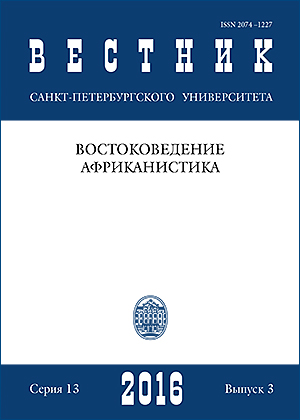Афганские генеалогии в ранних письменных источниках на пашто
DOI:
https://doi.org/10.21638/11701/spbu13.2016.305Аннотация
В статье исследуются генеалогические сведения, содержащиеся в произведениях афганских племенных вождей Хушхāл-хāна Хатака (ум. 1689) и Афдал-хāна Хатака (ум. ок. 1740/41) Дастāр-нāма («Книга о чалме») и Тāрих-и мурасса‘ («Украшенная драгоценностями история»). Решаемые в статье задачи включают выявление книжных и устных (фольклорных) источников афганской генеалогической традиции, зафиксированной в ранних письменных источниках на пашто; определение функциональности и идеологической составляющей генеалогических текстов; характеристику гендерного аспекта в системе патрилинейного родства; систематизацию и анализ новых данных для изучения этноконфессиональной истории паштунов, в том числе исторической хронологии формирования отдельных племенных объединений и этнической общности в целом, косвенных свидетельств этнической ассимиляции, стадиальности процесса исламизации (в первую очередь на основе статистики личных имен, а также с учетом существования параллельных «духовных» родословных). Материалы исследования подтверждают идею о том, что ко времени возникновения первого афганского государства в середине XVIII в. паштунские племена устойчиво воспринимали себя единым народом с общим культурным наследием, а этническая идентификация была одним из ключевых элементов и общественного, и индивидуального сознания. Приведенные в качестве иллюстраций фрагменты исследованных источников впервые переведены на русский язык.
Ключевые слова:
литература пашто, афганские племена, этнография, генеалогии
Скачивания
Библиографические ссылки
References
Загрузки
Опубликован
Как цитировать
Выпуск
Раздел
Лицензия
Статьи журнала «Вестник Санкт-Петербургского университета. Востоковедение и африканистика» находятся в открытом доступе и распространяются в соответствии с условиями Лицензионного Договора с Санкт-Петербургским государственным университетом, который бесплатно предоставляет авторам неограниченное распространение и самостоятельное архивирование.





